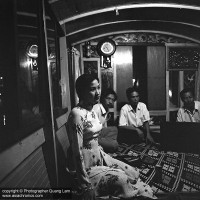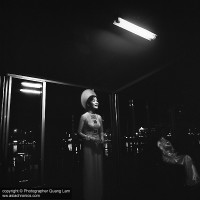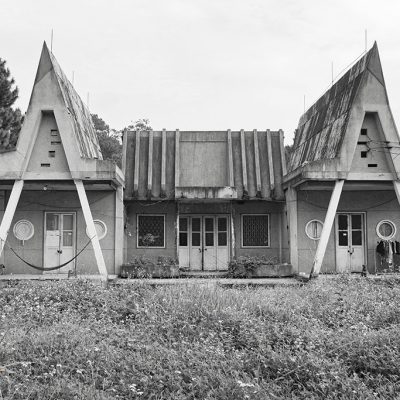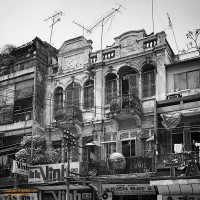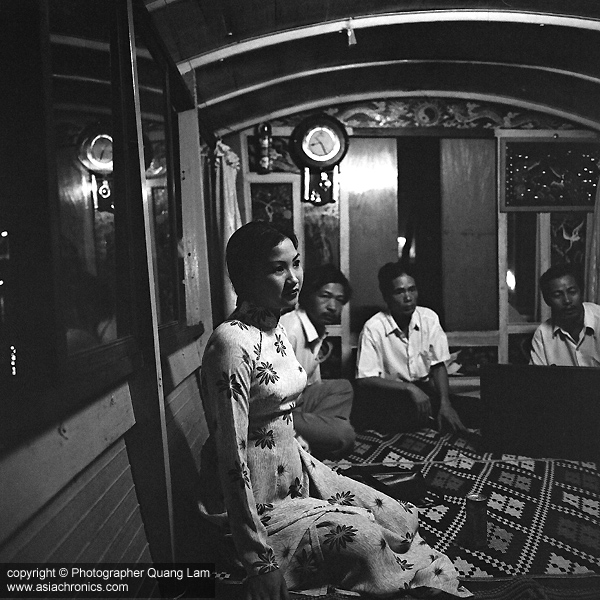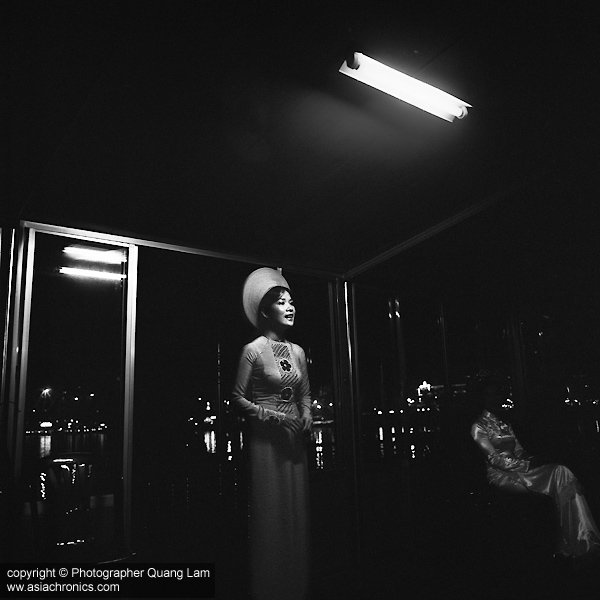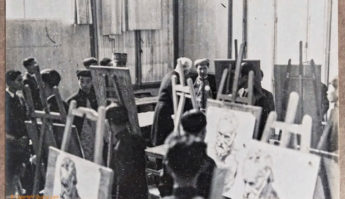Origin of Hue song at the court of Annam
This text comes from the book Mémoires de Son Excellence Huynh Con dit Đan Tường by Jean-Jacnal written 1924.
This biography of a former Minister of Rites at the Court of Annam contains historical details of his life and has an interesting description of music at the Court.
“Every night, we brought in singers. So little has been written about this category of people that no doubt I will be allowed to give some details about their life, their education and their manners.
In Tonkin and North Annam there is a special category of singers who are given the name of Cô-dâu or A-dâu, while the whole troupe takes the qualifier of Nhà-tro or Nhà-to. . The women who make up this one are generally single and they are always accompanied by a musician, whether they exercise in a particular residence, or whether they go to a mandarin who invites them there.
Although the profession of singer, as we shall see, is somewhat despised, it was not always so, at least according to what the legend claims.
We must go back to the dynasty of the later Lê to discover its origin.
According to a writing, of a religious nature, found in a pagoda raised to the glory of the corporation and built in the village of Xuân-Tao-Doai (phu of Da-Phuc, province of Phuc-Yên in Tonkin) it was the spouses Dinh-Du to whom fell the honor of being the initiators of the people of Annam in the art of singing,
It is reported in this grimoire that the wife of a mandarin named Dinh-Lê, gave birth to a child of all beauty, which was called Binb-Du. This happy family then lived in the village of Lé-Dao, huyên of Dông-Ngan, phù of Tu-Son, province of Bac-Ninh (Tonkin). The young Binh-Du thought only of contemplating nature and tasting it. the charms.
He contrived to make the sounds harmonious and he thus became a talented musician. When he was twenty years old, he walked alone, as he used to, in the mountain of Kiu-Son (huyên of Gia-Binh of the province of Bäç-Ninh). There he met a beautiful and charming young girl named Hoa-Nuong (the flower girl).
These two young people liked each other and married. But after a short time, the new bride, seeing her husband more occupied in dreaming than earning a living, tried to shame his companion: “Every man, she told him, must exercise a profession . But you are a musician, I do not sing badly. It is therefore appropriate to go and spread among our brothers the pleasant notions that we possess.
They did so and three years passed. At the end of this time a royal order called Dinh-Lé, the father of Binh-Du, to the Court, then to Thanh-Hoa, at that time Capital of the kingdom. But the mandarin died on the way. His family, while transporting the body of the deceased, returned to their village of origin, located near the capital.
Immediately after the burial had taken place, the son, respectful of the Sovereign’s will, went to the Court, accompanied by his wife. [1 wanted to inform the King of the cause of the disobedience of his unfortunate subject. But S. M. was ill and did not attend the hearings.
However, by dint of insistence, the spouses were admitted into his august presence. Binh-Du’s wife was deeply moved by seeing the lamentable state in which the Sovereign was. While her husband reported on the circumstances in which his father had passed away, she never took her eyes off the Master of Annam.
“Sire,” she ventured to say at last, “Your Majesty does not suffer from internal ailments, and I presume that persistent annoyances alone are the cause of Your discomfort. If you would allow your humble servants to distract you from their songs, I am sure of your recovery. We only need a few days.”
The King, whom the doctors could not rescue from his state of languor, then confided in her. After three days of music and singing, he had regained his health. Grateful, He had a feast prepared where He invited his healers and He took an order elevating Binb-Du to the title of Thanh-xà dai vuong (great prince, Green Serpent) and Hoa-Nuong to that of Man-dinh-hoa công chua (Princess, flower whose fragrance spreads in the Royal Palace).
The same ordinance prescribed that in future every singer had the obligation to deduct a sum of thirty sapeques from her earnings to buy gold papers and incense sticks. These were to be burned on the altars of the protective geniuses of the singers.
As legend has it, the Binh-Du spouses were haloed. When the feast was over, it is said, the musician’s wife let him know that she was a guilty fairy, descended from heaven to serve her sentence on earth. However, thanks to the fact that she had just propagated a consoling profession, which would no longer disappear from the place where men stay, she had obtained her forgiveness and she had to return to heaven.
She then disappeared, after having greeted the King and bid farewell to her husband. The latter, mad with grief at such a loss, killed himself, beating his head against a column of the Palace. When his soul had abandoned his body, the desperate was transformed into a green serpent which flew south.
The Sovereign, amazed, awarded the fairy and the one who had loved her so much, the aforementioned titles.
From all this it remains that certain words, which recall those which made up the names of these different characters, are sacred words which singers are forbidden to pronounce. They must deform them somewhat and Le becomes Loi, Hoa becomes Huê, etc. “



